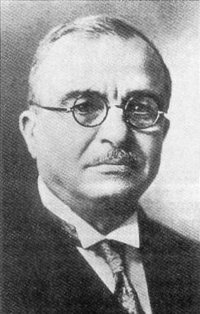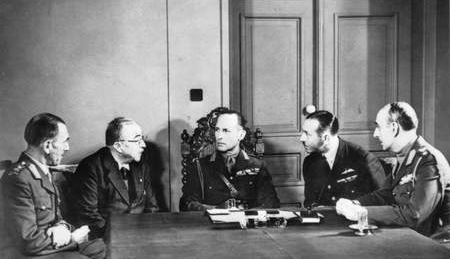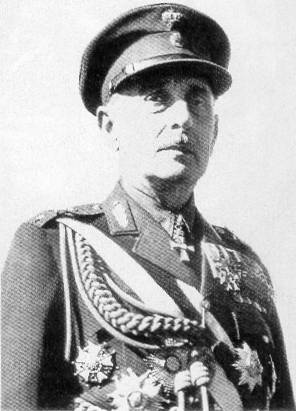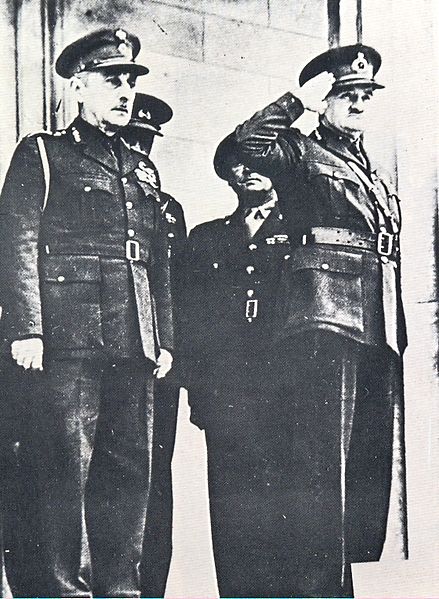<Back to Index>
- Prime Minister of Greece Ioannis Metaxas (Ιωάννης Μεταξάς), 1871
- Field Marshal of the Hellenic Army and Prime Minister of Greece Alexander Papagos (Αλέξανδρος Παπάγος), 1883
PAGE SPONSOR


Ioannis Metaxas (Greek: Ιωάννης Μεταξάς) (12 April 1871 – 29 January 1941) was a Greek general and politician, serving as Prime Minister of Greece from 1936 until his death in 1941. He governed constitutionally for the first four months of his tenure, and thereafter as a dictator at the helm of the 4th of August Regime.
Born in Ithaca, Metaxas was a career military officer, first seeing action in the Greco - Turkish War of 1897. Following studies in the German Empire, he returned to join the General Staff and was part of the modernizing process of the Greek Army before the Balkan Wars (1912 – 1913), in which he actively participated. He was appointed as Chief of the Greek General Staff in 1913 and was promoted to Lieutenant General in 1916. He prepared the military attack plans and conducted the diplomacy in the First and Second Balkan Wars that led to the annexation of what today forms the northern provinces of Greece of Epirus, Macedonia and Thrace.
A staunch monarchist, he supported Constantine I and opposed Greek entry into World War I. Eleftherios Venizelos, the prime minister, resigned over the refusal of Metaxas to aid the Allies' unsuccessful Dardanelles campaign and used the war as the major issue in the elections. When Venizelos won the May 1915 elections, he mobilized the army to aid Serbia, but was dismissed by the king. This dismissal solidified the rift between monarchists and Venizelists, creating the "National Schism" that would plague Greek politics for decades. In August 1916, Venizelist officers launched a revolt in Greece's northern city of Thessaloniki, which resulted in the establishment of a separate "Government of National Defense" under Venizelos. The new government, with the Allies' support, expanded its control over half the country, and entered the war on the Allies' side. In June 1917, with Allied support, King Constantine was deposed and Venizelos came to power, declaring war on behalf of the whole country on 29 June 1917.
Metaxas followed the king into exile in Corsica, neither returning until 1920 and the electoral defeat of Eleftherios Venizelos. Metaxas was one of the few who publicly opposed the ongoing Asia Minor Campaign, citing military considerations, and refused to assume any military office in the war. Following the defeat of Greek forces in Asia Minor, King Constantine was again forced into exile by a revolution led by Colonel Nikolaos Plastiras. Metaxas moved into politics and founded the Freethinkers' Party on 12 October 1922. However, his association with the failed royalist Leonardopoulos - Gargalidis coup attempt in October 1923 forced him to flee the country. Soon after, King George II (son of Constantine I) was also forced into exile. The monarchy was abolished, and the Second Hellenic Republic proclaimed, in March 1924.
Metaxas returned to Greece soon after, publicly stating his acceptance of the regime change. Despite his being one of the most prominent royalist politicians, and a promising start, Metaxas' foray into politics was not very successful. In the 1926 elections, his Freethinkers' Party claimed 15.78% of the vote and 52 seats in Parliament, putting it almost on a par with the other main royalist party, the People's Party. As a result, Metaxas became Communications Minister in the "ecumenical government" formed under Alexandros Zaimis.
However, infighting within the party and the departure of many members plunged the party to 5.3% and a single seat in the 1928 elections. The 1932 and 1933 elections saw the percentage drop to 1.59%, although the party still returned three MPs, and Metaxas became Interior Minister in the Panagis Tsaldaris cabinet. In the 1935 elections, he cooperated in a union with other small royalist parties, returning 7 MPs, repeating the performance in the 1936 elections.
After a disputed plebiscite, George II returned to take the throne in 1935. The elections of 1936 produced a deadlock between Panagis Tsaldaris and Themistoklis Sophoulis. The political situation was further polarized by the gains made by the Communist Party of Greece (KKE). Disliking the Communists and fearing a coup, George II appointed Metaxas, then minister of war, to be interim prime minister on 13 April 1936, and the appointment was confirmed by the Greek parliament.
Widespread industrial unrest gave Metaxas justification to declare a state of emergency on August 4, 1936. With the king's support, he suspended the parliament indefinitely and suspended various articles of the constitution. In a national radio address, Metaxas declared that for the duration of the state of emergency, he would hold "all the power I need for saving Greece from the catastrophes which threaten her." The regime created as a result of this self - coup became known as "the 4th of August" after the date of its proclamation.
The regime's propaganda presented Metaxas as "the First Peasant", "the First Worker" and "the National Father" of the Greeks. Metaxas adopted the title of Arkhigos, Greek for "leader" or "chieftain", and claimed a "Third Hellenic Civilization", following ancient Greece and the Greek Byzantine Empire of the Middle Ages. State propaganda portrayed Metaxas as a "Savior of the Nation" bringing unity to a divided nation.
Patterning his regime on other authoritarian European governments (most notably Fascist Italy), Metaxas banned political parties, prohibited strikes and introduced widespread censorship of the media. National unity was to be achieved by the abolition of the previous political parliamentary system, which was seen as having left the country in chaos (National Schism). Metaxas disliked the old parties of the political landscape, including traditional conservatives. Along with anti - parliamentarism, anti - communism formed the second major political agenda of the 4th of August regime. Minister of Security Konstantinos Maniadakis quickly infiltrated and practically dissolved the Communist Party of Greece by seizing its archives and arresting Communist leader Nikos Zachariadis. Suppressing Communism was followed by a campaign against 'Anti - Greek' literature viewed as dangerous to the national interest. Book burnings targeted authors such as Goethe, Shaw and Freud, and several Greek writers. Metaxas himself became Minister of Education in 1938, and had all school texts re-written to fit the regime's ideology.
Trying to build a corporatist state and secure popular support, Metaxas adopted or adapted many of Fascist Italy's institutions: a National Labor Service, the eight hour workday, mandatory improvements to working conditions, and the Social Insurance Institute (Greek: Ίδρυμα Κοινωνικών Ασφαλίσεων, IKA), until relatively recently the biggest social security institution in Greece. In terms of symbolism, the Roman salute and the Minoan double axe, the labrys, were introduced. Unlike Mussolini and other authoritarian regimes, however, Metaxas lacked the support provided by a political mass party. The regime's only mass organization was the National Organization of Youth (EON), whose literature and magazines were promoted in schools. Throughout his rule, Metaxas' power rested primarily upon the army and the support of King George II.
In foreign policy Metaxas followed a neutral stance, trying to balance between the UK and Germany. In the late 1930s, as with the other Balkan countries, Germany became Greece's largest trading partner. Metaxas himself had a reputation as a Germanophile dating back to his studies in Germany and his role in the National Schism; King George however and most of the country's elites were staunchly anglophile, and the predominance of the British Royal Navy in the Mediterranean could not be ignored by a maritime country like Greece. Furthermore, the expansionist goals of Mussolini's Italy drove Greece to lean towards the Franco - British alliance. The regime's literature gave praise to fellow European authoritarian states, especially those of Franco, Mussolini and Hitler.
The policy of Metaxas to keep Greece out of World War II was decisively broken when Mussolini demanded occupation rights to strategic Greek sites. When the Italian envoy presented these demands on 28 October 1940, Metaxas curtly replied in French: "Alors, c'est la guerre" ("Then, it is war"). However, according to popular legend, Metaxas simply told the Italian envoy, "Ohi!" ("No!") - -an incident that has become encapsulated in Greek popular feeling. "Ohi Day" is still celebrated in Greece each year. A few hours later, Italy invaded Greece from Albania and started the Greco - Italian War.
Thanks to preparations and an inspired defense, the Greeks were able to mount a successful defense and counter offensive, forcing the Italians back into Albania and occupying large parts of Northern Epirus (Southern Albania). Metaxas never saw the German invasion of Greece during the Battle of Greece because he died in Athens on 29 January 1941. Metaxas died of a phlegmon of the pharynx which subsequently led to incurable toxaemia. He was succeeded by Alexandros Koryzis. After the death of Metaxas, the German invasion of Greece had to take into account the fortifications constructed by Metaxas in Northern Greece. These fortifications were constructed along the Bulgarian border and were known as the Metaxas Line.
To this day, Metaxas remains a highly controversial figure in Greek history. He is reviled by some for his dictatorial state, and admired by others for his popular policies, patriotism, defiance to aggression, and his military victory against Italy.


Field Marshal Alexander Papagos GBE (Greek: Αλέξανδρος Παπάγος, 9 December 1883, Athens – 4 October 1955, Athens), was a Greek General who led the Greek Army in World War II and the later stages of the Greek Civil War and became the country's Prime Minister. His premiership was defined by the Cold War; American military bases were allowed on Greek territory, a powerful and vehemently anti - communist security apparatus was created, and the communist leader Nikos Ploumpidis was executed by firing squad.
His father was Major General Leonidas Papagos, who occupied very important posts during his military career, including Director of personnel at the War Ministry and aide - de - camp to the King. His ancestry was partly Vlach and partly from Syros. He studied in the Brussels Military Academy and the Cavalry School at Ypres, joining the Hellenic Army in 1906 as a Cavalry 2nd Lieutenant. He married Maria Kallinski, the daughter of Lt. General Andreas Kallinskis - Roïdis.
In the First Balkan War he served as a junior officer in the General Staff of King Constantine. As a captain, he held successive staff positions as well as taking part in the Siege of Yanina (Ioannina) and fighting in Macedonia from November 1912 until March 1913. He was a confirmed royalist, so when the King was deposed in 1917, he was dismissed from the Army along with many other officers. He was recalled after the return of King Constantine in 1920.
He served as operations officer to the Cavalry Brigade in the disastrous Asia Minor Campaign and was decommissioned in after the ruling government was forced out by a revolutionary council headed by Nikolaos Plastiras. He was again recalled in 1927 with the rank of Major General and promoted to Lieutenant General in 1931 and Corps Commander in 1934. In October 1935, as a Lieutenant General and Chief of the Army, along with the chiefs of the Navy and the Air Force, he helped topple the government of Panagis Tsaldaris and declared the restoration of the monarchy, allowing for the return of King George II. He was appointed Minister of War in the Georgios Kondylis, Konstantinos Demertzis and Ioannis Metaxas governments. From his position, he employed the Army to support Metaxas' declaration of dictatorship in 4 August 1936.
During the next years, as Chief of the General Staff, he actively tried to reorganize and reequip the Army for the oncoming war. At the outbreak of the Greco - Italian War on October 28, 1940, he was Commander - in - Chief and directed Greek operations against Italy along the Greek - Albanian border. The Greek army, under his command, managed to halt the Italian advance by 8 November and forced them to withdraw deep into Albania between 18 November and 23 December. The successes of the Greek Army brought him fame and applause. Time Magazine placed him on its cover, as Papagos 'Commander of the Greeks' on 10 December 1949. A second Italian offensive between 9 and 16 March 1941 was repulsed. Despite this success, Papagos was forced to maintain the bulk of the Greek Army in Albania, and was unwilling to order a gradual withdrawal to reinforce the north eastern border as German intervention came closer.
After the German invasion on 6 April 1941, outnumbered Greek forces in Macedonia fiercely resisted the German offensive at the so-called Metaxas Line, but were outflanked and Papagos endorsed their surrender. Soon after the Army of Epirus capitulated and by 23 April the Greek government was forced to flee to Crete. Papagos remained behind and in July 1943, together with other generals, he was arrested and sent to concentration camps in Germany. In late April 1945 he was transferred to Tyrol together with about 140 other prominent inmates of the Dachau concentration camp, where the SS left the prisoners behind. He was liberated by the Fifth U.S. Army on 5 May 1945.
In 1945 he returned to Greece, rejoined the Army and reached the rank of full General in 1947. In August 1945, he was appointed an Honorary Knight Grand Cross of the Order of the British Empire by the British. On 29 January 1949, he was once again appointed Commander - in - Chief, to defeat the Communists in the Greek Civil War. This he achieved, with extensive American aid, including napalm equipped aircraft, and the extensive deployment of Special Forces (LOK), during the Grammos - Vitsi campaign between February to October of that year. As a reward for his services, he was awarded the title of Marshal on 28 October 1949. His is the only Greek career officer to ever hold this rank.
He continued to serve in his capacity as Commander - in - Chief until 1951, while Greece was in a state of political instability, with splinter parties and weak politicians unable to provide a firm government.
In May 1951 he resigned from the Army in order to become involved in politics. He founded the Greek Rally (Ελληνικός Συναγερμός), modeled after De Gaulle's Rassemblement du Peuple Français and won the September elections with 36.53 percent of the vote, largely due to his popularity, his image as a strong and determined leader, and the communist defeat in the civil war, which was attributed in great part to his leadership. Despite this victory, Papagos was unable to form a government on this majority, and had to wait until the November 1952 elections, where his party tallied an impressive 49 percent of the popular vote, gaining 239 out of 300 seats in Parliament. The Field Marshal, with his popular backing and support from the Americans was an authoritative figure, leading to friction with the Royal Palace. Papagos' government successfully strove to modernize Greece (where the young and energetic Minister of Public Works, Constantine Karamanlis, first distinguished himself) and restore the economy of a country ruined by 10 years of war, but was criticized by the opposition for doing little to restore social harmony in a country still scarred from the civil war.
One of the major issues faced by Papagos was the Cyprus problem, where the Greek majority had begun clamoring for Enosis (Union) with Greece. In response to demonstrations in the streets of Athens, Papagos reluctantly, as this would put Greece in confrontation with Great Britain, ordered Greece's UN representative in August 1954 to raise the issue of Cyprus before the UN General Assembly. When the EOKA rally to end the British rule in Cyprus began in 1955, Papagos was in declining health and unwilling to act. The clashes in Cyprus, however, led to a deterioration of Greco - Turkish relations, culminating in the Istanbul Pogrom in September. By that time, Papagos was ill, and on 4 October 1955, he died.
The Athens suburb of Papagou, where the Ministry of Defense is located, is named after him.